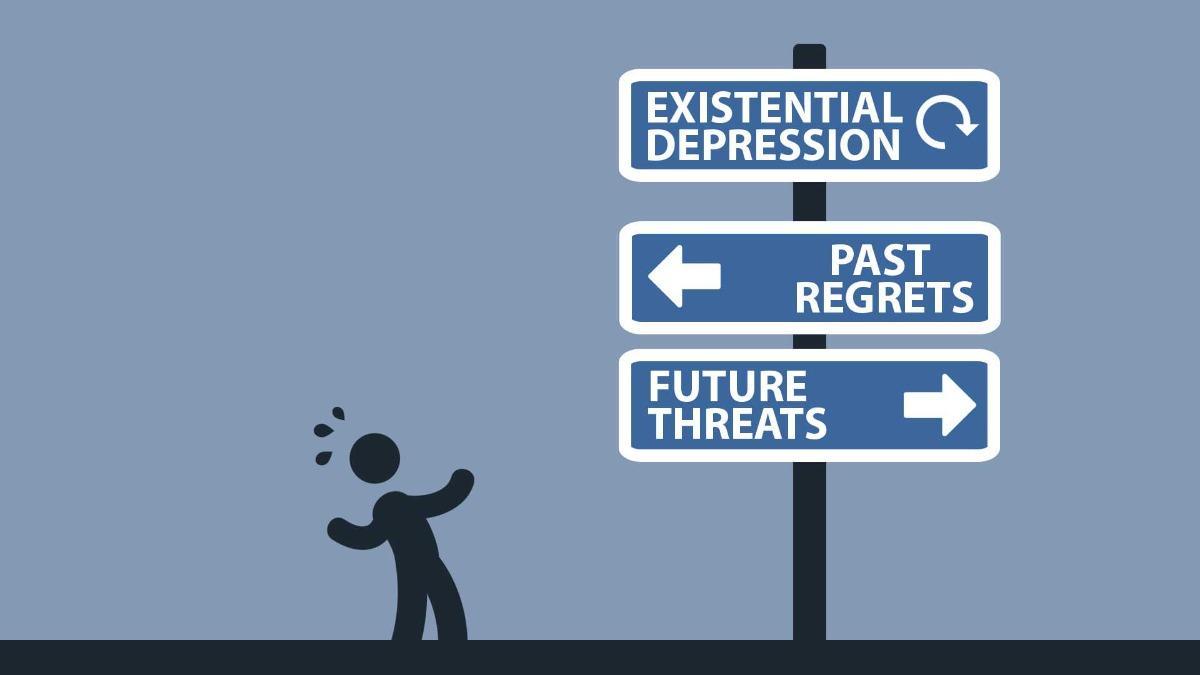There are a number of different types of depression and each person may suffer from a different one. When one’s depression is brought on by questions about the meaning of life, life itself, or death, this is considered existential depression.
Existential Philosophy indicates that humans are driven to have internal meaning in their lives. This means we desire and want to choose and pursue things that give us meaning. Being entirely free beings, we have sole responsibility for our misery or happiness. So we strive to create meaning in our lives in the form of relationships, family, religion, charity, hobbies, work, and more.
When you are facing issues with freedom, death, or life, you can face existential depression. If you find you are asking questions such a,s is my life only to work, create a family of my own, and die, you may be suffering from existential depression. Other questions that people who are suffering from this condition tend to ask include:
- Does anyone truly care about me?
- Will I find someone who truly understands and believes in me?
- Is there a God and where is the proof that he cares?
You may ask any other question that is triggered by a sense of hopelessness or feeling like your life is meaningless.
Those who experience clinical depression may also have issues related to existential experiences and questions. Many clinicians will provide therapy not only to address depression but also to explore life’s meaning with the patient, which can help you find the meaning you are searching for in your life.
TREATING EXISTENTIAL DEPRESSION WITH PSYCHOTHERAPY
Finding a passion or meaning for life is very important to a lot of people. Your need to find an answer can bring on an episode of existential depression. Psychotherapy usually focuses on helping you find meaning or helping you answer questions about your life. There is not too much research out there on existential depression and so there is no specific approach to therapy or treatment. Your therapist may help you to cope with feelings of inadequacy and confusion.
HOW TO TELL IF YOU ARE HAVING EXISTENTIAL DEPRESSION
- Do you consider yourself a trailblazer? What does that even mean?
-
- You can feel and see what most other people don’t.
- You hold yourself and others to high expectations.
- You are kept awake at night because of interpersonal ideas and conflicts.
- You are very passionate about upholding justice and fairness.
- You get obsessed with the things you love.
- You are very curious.
- You must always speak the truth and cannot stand hypocrisy.
- You crave freedom and autonomy.
- You have an independent mind.
- You are strong-willed.
- You do not like explanations that do not make sense.
- You are not fond of routine activities or arbitrary instructions.
- You are bothered by the gap that exists between others and yourself in the wider world.
If you answered yes to many of the above, you may be a trailblazer. You have a deep capacity for connection and joy but may have over the years struggled with self-doubt, bouts of anxiety, inferiority complex, and existential despair.
EXISTENTIAL DEPRESSION AND INTENSE PEOPLE

A paper published in the European Psychiatry journal in 2012 indicated that therapy methods specific to traditional depression therapy are not effective. It is believed that depression is better treated when it is understood from the TPD – Theory of Positive Disintegration. This is a very popular concept that was created by Kazimierz Dabrowski. In this theory, depression is not an illness but instead is an indicator of one’s creative potential.
Mental health is traditionally defined by how well a person can adapt to certain social norms. This notion, however, does not take into account cultural and biological diversity. It completely disregards the fact that as humans we want to not just meet our basic needs but also want the opportunity to express our idiosyncratic nature. These are the things that make each of us uniquely ourselves, they include our intensity, our quirks, and also our strengths. Winnicott considers this one’s true self, while Dabrowski considers it one’s true essence.
When it comes to TPD, growth is considered as moving from a confirmative or subservient behavior into one’s authenticity. We are highly multidimensional and for many, it is while we are going through our challenging experiences that we realize just how multidimensional we are.
To walk away from the old and get to the new, there is a need for old beliefs, behaviors, and values to be loosened. In doing so, an existential crisis can occur. This is where you start questioning the meaning, purpose, and value of life. This is when all the things we have learned from social circumstances, family, or education may not help to answer your questions.
Over time, your normal may start to look unethical, insufficient, or even hypocritical. A part of us will want to think we are wrong or assume that there is something inherently wrong with us causing us not to fit in. Our inner critic at this point questions and scrutinizes us harshly.
Treatment has to carry us down a path of soul-searching and self-discovery. Many people develop their very own auto therapy such as journaling, writing, creating music or art, and learning from others. This is a learning process that gets better over time as you learn how to nurture, comfort, or console yourself. Eckhart Tolle likens this to a sort of psychic death followed by rebirth.
STRIPPING AWAY

Each person goes through a natural life cycle where they must learn to deconstruct all of their current forms, so they can create something new. This is our natural life cycle as a living thing.
In reconstructing from our current form, we can experience the death of Ego which will bring forth a re-birth. We must sometimes release our strong beliefs, our ideas, and our future vision as well as the career trajectory we thought was going to be ours, our titles, and sometimes even our relationships.
When we are in a period of transition, we often go back and forth between the following stages:
- Denial – Feeling like you are no different from anyone else and cannot do that great thing that needs to be done.
- Anger – Why is this happening to me and not others? Why can’t everybody else be more understanding?
- Bargaining – Wanting to have another chance or needing external recognition to feel satisfied.
- Depression – This is where we have feelings of hopelessness, that we are misfits, and that we will never be happy and fulfilled. At which point we start to wonder why we should bother anyway.
- Acceptance – This is the point where we realize that sometimes it will not be very easy living and coping in this world, but that you are who you are and your authenticity is important. All the things and people that are for me will come to me when the situation is right.
During this process, it is important to remember to be compassionate with yourself and to have patience as you go through the process. Remember that your life goes through seasons and cycles similar to everything else in nature. Now you can see why you are here and that moving to the next step may require something different.
How much time have you spent on your Adapted self, exploring and setting the foundation necessary for your growth? There is no way you can leap before you are ready, so everything you have done up to this point was preparing you for this point. You have been triumphant so far as you dived in and gave it your all for it to work up to this moment. The natural order of life is that you only know the answers when it is the right time, not sooner and not later.
Your period of despair and confusion can and will lead to the resolution of your conflict. This can lead you to a renewed sense of integrity and independence. You become an original thinker as you reach a higher level of functioning. You will notice how your approach and creativity for solving problems evolve. You will notice how you are able to better manifest your meaningful domestic endeavors, art, and talents through social actions and words.
You may now notice multiple cycles of crisis and renewal that you have experienced throughout your life. You are always growing and looking for a better version of yourself. You may notice that there were times that you have stretched yourself and tested your limits that you weren’t even aware of. Expanding your consciousness comes with suffering, sadness, self-doubt, aloneness, and often conflict.
You have the potential to develop without boundaries, you want to bring out your full potential or else it would swallow you from the inside out. While existential depression can recur throughout your life, this does not define your entire life as unhappy and in never-ending turmoil.
When you find yourself in a rough patch, remember all the times you have emerged from the chaos with a new way of life, new insight, and a new order. Each time you come through this fog you will find yourself feeling closer to your ideal self, deeply alive, and closer to achieving your full potential.
When you can see your inner conflicts and where they begin, you will be able to reframe your struggles and give them new meaning. Learn to reconcile with your current place in the life path rather than wishing you were someone else.
EXISTENTIAL DEPRESSION IN GIFTED INDIVIDUALS

Those who are talented and gifted are at a higher risk of experiencing existential depression. Though others are at risk as well. Persons of higher intellect are more prone to this type of depression and more prone to have it spontaneously. It is often tied into their positive disintegration experience that we note Dabrowski referring to.
When an individual confronts issues related to their existence, this is where existential depression may arise. The four issues can be:
- Death – This is inevitable.
- Freedom – We get to give our world structure, and so we are the creators of our own freedom.
- Isolation – There is always a gap between you and those you form relationships with no matter how close you get.
- Meaninglessness – This arises from the first three; we must die, we construct our worlds, and we are always alone to some extent, then life may seem meaningless.
One of the reasons this condition happens disproportionately more among gifted individuals is that one considering such notions has to go through substantial reflection and thought. They cannot simply focus on the superficial day-to-day life tasks and be thrown into depression, but instead, due to their gifted nature, they go into a deeper reflection of their talents and abilities and consider why they are given such gifts/talents if just to die.
Do you struggle with depression?
We have clinicians expert on depression, feel free to read about them, or book a free consultation to review your situation.
Gifted individuals tend to be idealists while simultaneously seeing all the ways their world is falling short. They tend to be intense and so when their ideals are not met they can become very frustrated and disappointed. They are able to quickly spot little absurdities, inconsistencies, and arbitrariness in their surrounding fellow humans and society as a whole. They challenge these traditions and as they share these concerns with others they are often met with puzzlement and sometimes even hostility.
For the gifted, it is hard to understand how people of their particular age group do not have the same concerns that they do. Most gifted individuals by 1st grade appear to be highly strung and are often isolated from their peers and even their families. This only gets worse as they realize their need to discuss weighty concerns are not met with the same gusto by others.
When you combine their intensity with their potential you can see why it can be so easy for them to get frustrated as they see limitations to their minds and way of thinking in both time and space. These individuals usually have so many talents and cannot find the time to develop them all. This may further push them into an existential depression as they consider the repercussions of not choosing the right vocation as they may have equal passions for neurology, violin, international relations, or mathematics.
HOW THE GIFTED REACT TO THEIR FRUSTRATIONS
As they realize their frustration, they can become angry quickly, but this is often found to be futile. The anger is often directed at fate or other matters that are outside of their control. Realizing this, they can feel powerless and in feeling powerless with all their gifts and talents they can easily and quickly fall into depression.
When this depression begins, the gifted individual will try to anchor themselves and try to find some sort of meaning to help pull themselves out. As they struggle with this, they may notice that they will start to be more aware of how brief and finite their lives are and how alone they are in the grand scheme of things. This can be frightening, but it can also help to free one with regard to how they choose to live their life. As they ask themselves if this is all there is to life, they may also ask themselves if the only way life has meaning is to give it meaning themselves. This one seemingly insignificant question can be the spark on how to bring meaning back into their lives.
These are the thoughts that go through the minds of adults going through an existential crisis which can lead to or may include existential depression. When these thoughts arise in the minds of pre-teens and teenagers it is more concerning as they can be precursors to suicide and need careful attention.
HOW WE CAN HELP

While the finiteness of our existence is something we cannot do anything about, we can learn how to feel understood and how to bridge the gap between people to get rid of loneliness. We can manage our isolation and our freedom. It helps to know that you are not the only person grappling with these feelings and that others understand.
A session with a therapist can help you start on the journey of getting better, accepting the things you cannot change, and changing those that will give your life more meaning.
BREAKING THROUGH ISOLATION WITH TOUCH
Touch is a great way to break through a sense of isolation. Just as infants need to be touched, persons experiencing existential depression need it too. It is an instinctual and fundamental aspect of human existence.
One aspect of treating people with existential depression is simple daily hugs. This may not be a full-on hug but it can be a touch on the arm, wrapping one’s arm around their shoulder or waist. It can be a high five, playful jostling, anything that creates a loving and caring physical connection.
The choices and issues involved in managing your freedom are more intellectual, the sensory solution of touch is a reassuring aspect of an emotional crisis. An unstructured world can provide us with a myriad of choices that can leave us feeling overwhelmed.
In exploring alternative ways and paths to add structure to your life, you can overcome existential depression. A therapist can help you on this journey and guide you through finding for yourself what type of structure will help you to feel better and overcome this period of uncertainty in your life. As your therapy progresses, you will be able to form a more meaningful framework for your life.
HOW EXISTENTIAL ISSUES LEAD GIFTED INDIVIDUALS TO RUIN
Many gifted individuals end up burying themselves in causes such as social, political, or academic matters, and even cults. The depression can come on while trying to bury themselves and often is mixed with attempts to belong that are desperate.
It is important to note that an existential issue is not something that you only deal with once, but you don’t have to go into existential depression each time you have an issue. These issues may revisit and so the treatment is really to help individuals who are suffering to realize they are not alone in their feelings. Therapy also works to encourage them to adopt hope about life and all its many possibilities. They can take comfort in the words from this poem from Langston Hughes, an African-American Poet.
“Hold fast to dreams,
For if dreams die,
Life is a broken-winged bird
That cannot fly.
Hold fast to dreams.
For if dreams go,
Life is a barren field
Covered with snow.”
~ Langston Hughes
With this hope, why not schedule a free consultation with us today to discuss your feelings of existential depression.
Do you struggle with depression?
We have clinicians expert on depression, feel free to read about them, or book a free consultation to review your situation.
